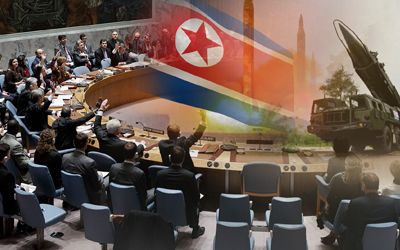The South Korean government on Sunday welcomed the United Nations' adoption of a new sanctions resolution against North Korea, calling on the country to halt all provocations.
In a statement released shortly after the adoption of a new resolution, the Ministry of Foreign Affairs said, "The government welcomes the unanimous adoption of Resolution 2371 by the U.N. Security Council in response to North Korea's ballistic missile provocations on July 4 and 28."

"Through the resolution, the UNSC strongly condemned North Korean ballistic missiles and imposed more strengthened sanctions, proclaiming once again the international community's determination that it will never condone North Korea's nuclear and missile development," according to the statement.
The government urges North Korea to take the international warning seriously and immediately stop its reckless provocations, it said, also calling on the North "to come out to the path of dialogue for denuclearization and peace."
Seoul will faithfully implement the latest resolution in close coordination with the international community, as well as the existing sanctions resolutions on North Korea, according to the statement. It also stressed that the government "will continue its efforts to achieve the fundamental denuclearization of North Korea and build permanent peace on the Korean Peninsula."
The international organization moved to penalize the North after it successfully test-fired two intercontinental-range ballistic missiles last month that may have the capability to hit the U.S. mainland.
The UNSC sanctions aim to slash North Korea's annual export revenue of US$3 billion by a third and include a ban on all exports of coal, iron, iron ore, lead, lead ore and seafood.
The U.S.-drafted resolution also calls for capping the number of North Korean workers overseas and restricts all new joint ventures with North Korea and additional investment in current ventures.
Moreover, it subjects nine North Korean individuals and four entities to asset freezes and travel bans. The move is expected to deprive the communist regime of key sources of export revenue.
"The resolution imposed a blanket ban on the exports of coal, iron and iron ore, which had been given exceptions in previous resolutions and newly adopted export bans on lead, lead ore, as well as limits on the employment of overseas North Korean workers," the foreign ministry here said.
"We expect it would have an effect of significantly cutting North Korea's foreign currency income," the ministry also said, putting the estimated amount of the cut at $1 billion, most of them from coal and seafood exports.
"It would thus help shutter the foreign currency revenue channels for North Korea's nuclear and ballistic missile programs while having an effect of delivering a clear message to the North Korean regime on the international community's no tolerance of its nuclear program," according to the ministry.
The ministry also hailed the resolution for taking "effective" measures aimed at blocking the North Korean procurement network for weapons of mass destruction.
The UNSC resolution was well-received in Japan, where Prime Minister Shinzo Abe said in his statement that the resolution is a clear international message that a higher level of pressure is needed to deal with North Korea's "realistic" threats.
Close global cooperation involving South Korea, the U.S., and China and Russia should be secured to guarantee the effectiveness of the resolution, Abe said, adding that the Japanese government will work toward resolving the North Korean issues under the principle of talks and pressure.
He also called on North Korea to abide by UNSC resolutions, and refrain from further nuclear and ballistic missile tests, saying that Japan strongly demands the North take specific action for the denuclearization of the peninsula. (Yonhap)

